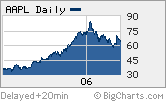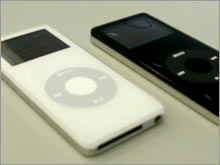|
Apple investors look for Intel effect
When company reports results Wednesday, analysts will have a close eye on sales of new Macs.
NEW YORK (CNNMoney.com) - When Apple reports its second-quarter earnings Wednesday, investors and analysts will watch closely for evidence of how the company's switch to Intel chips is panning out. The March quarter is seasonally slower for Apple (up $0.06 to $66.28, Research), and analysts and investors are universally predicting a big slowdown in both iPod and Mac sales from December's blowout numbers for that reason.
But they are nonetheless forecasting big growth in earnings and revenues from the year-earlier quarter. Wall Street analysts are expecting earnings per share of 43 cents, or 28 percent year-over-year growth, on revenue of $4.5 billion, a 39 percent increase over the same quarter last year, according to a survey from Thomson FirstCall. While analysts expect strong year-over-year growth in iPods once again, they do not think that will be the case with Mac sales. That's because this quarter also marks the first time that the company started making Macs with Intel chips, a transition that had been announced last year but nonetheless came six months earlier than expected. The company has already rolled out three lines of Macs with Intel chips, and Apple CEO Steve Jobs said the entire Mac line will contain Intel chips by the end of the year. Intel shift = uncertain sales
Wall Street analysts are forecasting sales of roughly 1.2 million Mac units in the quarter, up just slightly from the 1.07 million Macs Apple sold in the same quarter last year. While the March quarter is traditionally slower than the December quarter, given year-end holiday sales, the new Intel-based machines may have given shoppers an incentive to buy. It remains to be seen whether they took the bait, however, especially since availability of the first Intel-based Mac laptop, the MacBook Pro, was severely constrained for the first month after it began shipping on Feb. 14, according to Piper Jaffray analyst Gene Munster. He estimates that Apple was only able to meet demand for about two weeks in the quarter. The Intel-based iMac desktop debuted in January, while the Intel-based Mac mini debuted on March 1. "The iMac and the MacBook Pro are doing well; we are still hearing sales for the (Intel) mini are kind of lukewarm," said Shaw Wu, an analyst with American Technology Research. Wu thinks Apple's BootCamp software, released in April, will accelerate Mac adoption, since it allows users to run both Windows and Mac operating systems on their Macs, thereby eliminating a barrier to the Mac world for people who need to run Windows-only applications for work or school but still want to buy a Mac. But that acceleration will take some time, Wu adds. Chirag Vasavada, an analyst at T. Rowe Price whose firm owns Apple shares in the funds he advises on, thinks Wall Street's 1.2 million estimate is a bit high. He adds that computer buyers may be putting off purchasing iBooks, the company's popular line of Mac laptops for consumers, until that line gets an Intel makeover later this year. "There seems to be some deferral of purchasing until new products come out," he said, adding that the transition may cause short-term disruptions in sales. But he does not think these disruptions will be a big concern to longer-term investors. Post-holiday hangover for iPod?
Apple sold a whopping 14 million iPods last quarter, thanks to strong holiday sales and the introduction late in the year of both the iPod nano and video-enabled iPods. Analysts are divided on how many iPods they expect the company to sell this quarter, with estimates generally falling in the 8 million to 10 million range. "They didn't release a new iPod this quarter and it's a seasonally weak period, so there's the post-holiday hangover," said Vasavada. But if Apple sells 9 million iPods, as a handful of analysts think it might, that's still a 70 percent increase over the number of iPods sold in the year-earlier quarter. Research firm Current Analysis said the digital audio market as a whole fell 44 percent from the December quarter, but the firm predicts Apple's share fell only 22.3 percent by comparison. That would translate to 11.5 million iPods sold in the March quarter, which is well above many Wall Street analysts' expectations. Vasavada, who is expecting iPod sales in the neighborhood of 7.7 million iPods shipped, thinks the iPod number will be interesting this quarter, because unlike last year's March quarter, in which Apple released the iPod Shuffle, no new iPod products came out this quarter. "This is the first time we are going to get a chance to see what normalized iPod demand is," he said. "For the quarter ending December they had the nano; prior to that it was the color screen iPod." Wu of American Technology Research thinks the nano, the ultra-slim, flash memory-based iPod that replaced the company's popular iPod mini, will see the biggest sales drop off, in part because it was such a hot seller during the holiday period and also because it's still an expensive consumer product given its price range of $149 or $199, depending on its music storage capacity. "Now that we are not in the holiday period, price matters, and that's why we expect that to see the biggest decline," said Wu. Rod Bare, associate director at Morningstar, said investors should pay close attention to how much iPod sales account for Apple's total net sales because they carry lower margins than Macs. iPod sales make up about 40 percent of Apple's total net sales, according to analysts. Long-term prospects still strong
Apple's stock has proved to be volatile this quarter, hitting a high of $85.59 on Jan. 13 but then retreating to the $60s, closing yesterday at $64.81. Jonathan Hoopes, an analyst with ThinkEquity Partners, thinks the stock will appreciate markedly, given that in terms of world wide market share, Macs have no where to go but up, he said. Mac computers currently account for about 2.3 percent of the world wide market for personal computers, according to industry tracker IDC. "Even a (half a percentage point) increase corresponds to very significant top line growth," he said. Hoopes does not own shares of Apple, and his firm has no banking ties to the company. Wu of American Technology Research does not own shares of Apple, and his firm has no banking ties to the company. Morningstar's Bare does not own shares of Apple and his firm has no banking relationship with the company. Piper Jaffray's Munster does not own shares of Apple but his firm makes a market in the securities. -------------------------- Seeking the cure for IBM's big blues: Click here.
Is there an online video bubble? More here. |
|


